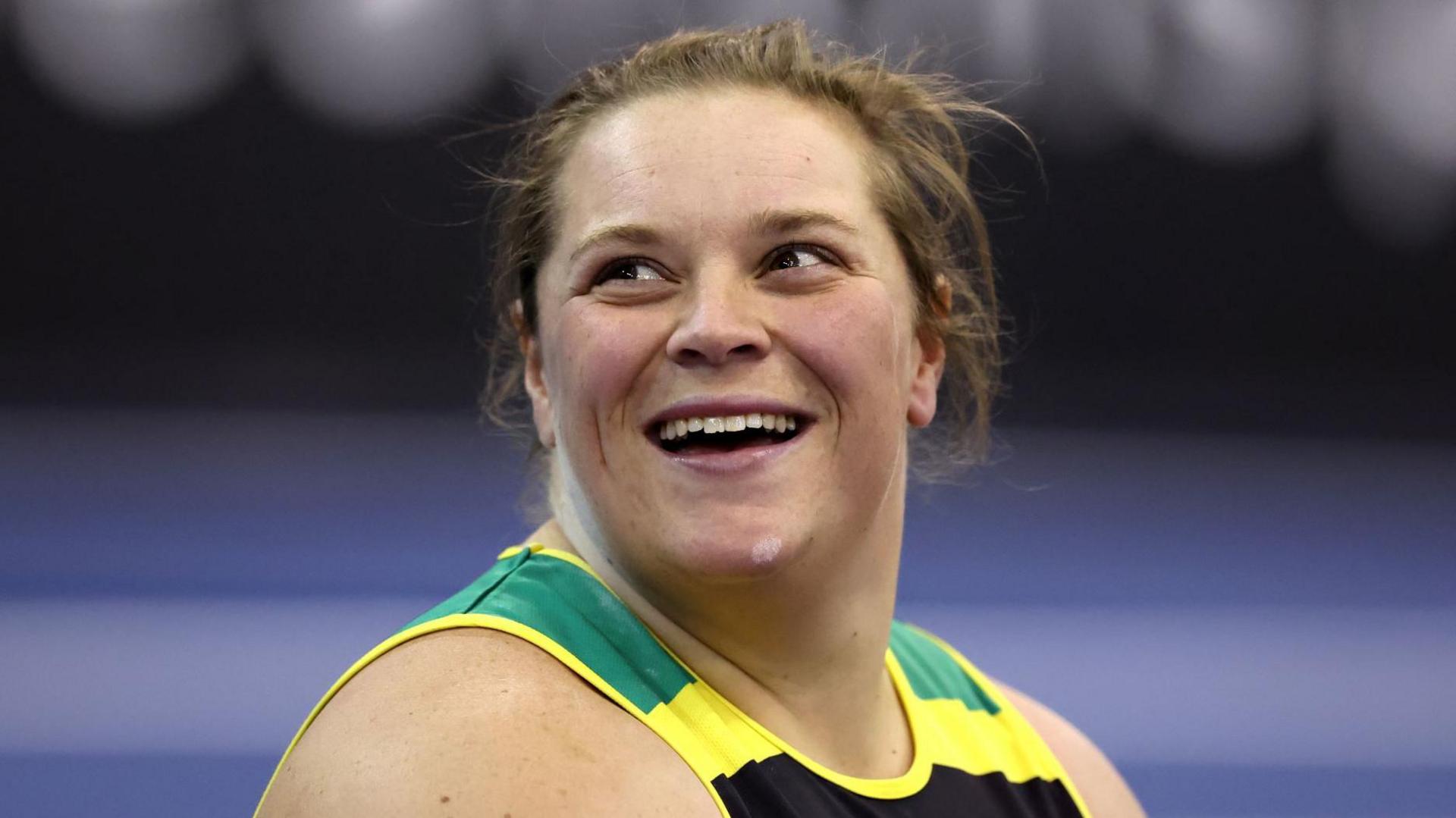'I wish I had spoken about my sexuality years ago'

Sophie McKinna is targeting a place at her second Olympic Games this summer
- Published
Sophie McKinna is a six-time national shot put champion who represented Team GB at the Tokyo 2020 Olympics and has contested world, European and Commonwealth finals. Last year, she chose to speak publicly about her sexuality for the first time. As part of BBC Sport's Pride Month series, she shares her story.
A happy athlete is a performing athlete. Any athlete will tell you that.
When you are able to be yourself, to be happy and free, performances follow. Last month I produced my furthest throw in two years.
I wish I had spoken openly about my sexuality years ago - and I'd definitely say to my younger self 'get a move on'.
I am a completely different person since I first spoke openly [about being gay] on The LGBT Sport Podcast in April 2023. Now I'm no longer worried. There's no more paranoia. I post openly on social media, something I had never done previously.
It was a decision I weighed up for well over a year. To anyone in a similar position I would say definitely do it, don't hesitate. It was one of the most freeing experiences for me.
I never feel like I have to hide myself in situations anymore. I no longer have the stress and anxiety. Myself and my partner are currently planning our wedding, which is something I would never previously have dreamed of saying openly because I was so worried about what people would think.
I decided to speak openly about my sexuality last year because I was fed up of being in the shadows.
It was something that was never spoken about, even though those close to me and everyone on the athletics team knew. In the end, I realised I should be able to be completely myself when doing my job.
At the time I was in a relatively new relationship and I didn't want to hide that. Why should I feel as though I can't share my happiness with the world? After all, sport is as much about the people behind the scenes as the athletes themselves.
A big part of not taking the decision sooner was because I want to be defined by my sporting performances.
That was a massive thing for me. You should not be defined by your sexuality, it has no impact on how far I throw the shot.
I also lacked the confidence to believe that I could be a role model for people to look up to. But I was lucky to have friends who encouraged me, supported me, and - as cheesy as it may sound - allowed me to find myself.
You dread the lack of support. But then you realise that, actually, you had built that up to something it isn't. I certainly made it worse in my head than it really was.
I was so concerned with what people outside my closest bubble would think. I always felt like I had to be looking over my shoulder. Was anyone watching? Has anyone said anything?
It felt like paranoia because I was so worried about who would tell who, and who might say what.
I didn't expect the reaction I got at all. I didn't have an idea it would be so far-reaching, because you don't necessarily realise the impact your own story might have on others when you're in the middle of it.
I was touched by the messages I got in response. It is in moments like that when you realise you are actually a role model - and, by doing what you're doing, you can inspire people and open doors for other people in their own lives.
That is way bigger than sport.
Visibility is massively important. I received so many message from people who still don't feel they can talk openly about their sexuality.
That is really sad because it is such a freeing experience. But as the saying goes: 'If you can't see it, you can't be it.'
That is why, if you have a platform and a voice, you should speak out to support those people who don't yet feel confident enough to do it themselves.
The launch of the Athletics Pride Network by British Athletics in 2020 was huge progress. It can bea way of helping young athletes especially, providing them with a safe space.
I'm keen to begin work with the Athletics Pride Network that can really help people, to allow them to feel free and be themselves without any judgement.
I want people to be able to experience the same feeling I have now and to realise it's not actually such a scary thing to talk about.
It takes a village to build an athlete and I hope to repay the people who have supported me by competing at Paris 2024 this summer.
I didn't want to potentially give the performance of my life at the Olympics but not be able to celebrate with the people that I love. I didn't want that looking-over-the-shoulder feeling any more.
The more openly gay people who use their platform to speak about it, the more younger people in sport and beyond are going to feel comfortable having those conversations.
I wanted to be able to have that impact on people, to let them know I had a really positive experience and, while I accept I'm lucky in that sense, you can have that too.
That is the biggest thing I want to come from this, for people to feel comfortable in their own skin and be free to live their lives how they choose.
Sophie McKinna was speaking to BBC Sport's Harry Poole.